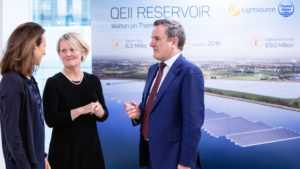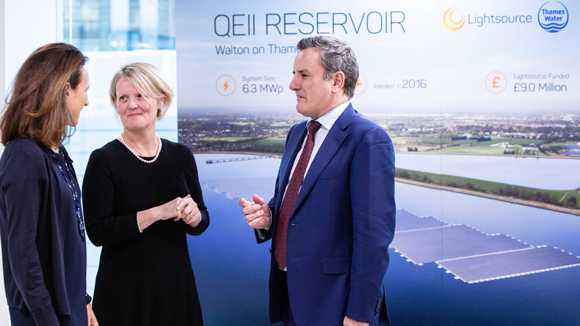RBS provides funding to a variety of clean energy companies, including solar developer Lightsource BP. Image: RBS
RBS has announced that it is increasing its lending to the sustainable energy sector, after the securitisation of £1.1 billion of loans to the UK sustainable energy market.
lending to the sustainable energy sector, after the securitisation of £1.1 billion of loans to the UK sustainable energy market.
The banking heavyweight has secured a deal with Macquarie Infrastructure Debt Investment Solutions (MIDIS) to allow for synthetic risk transfer securitisation. Capital can now be recycled to allow for the increase in the bank’s lending to the sustainable or renewable energy sectors.
This is the first securitisation of its kind, according to RBS, as an exclusively UK environmental, social and governance (ESG) synthetic securitisation from a financial provider specifically for supporting a sustainable energy sector.
RBS’ technology portfolio includes loans to solar, onshore and offshore wind, smart meters, energy from waste and biomass power. Sustainalytics, an independent ESG analysis firm, assesses the projects and decides whether they can be verified as green before securing a loan.
RBS chief executive, Alison Rose, said that as the company was the biggest lender to the renewable energy sector in the country, “we have an important role to play in supporting Britain’s transition to a low or zero-carbon economy”.
“We want to be a leader on this issue, facing into the climate challenge with the customers and communities we serve,” Rose continued.
Already, RBS has committed to providing £10 billion of funding and financing by the end of 2020 to the sustainable energy sector. This funding has continued to grow in recent years, with the bank trebling its lending to solar projects between 2015 and 2016 to over £1 billion.
Bruce Riley, managing director of Project Finance at RBS subsidiary NatWest, added that: “This transaction enables a significant release of the capital, which we will recycle to increase further our lending to the sustainable energy sector and support the growth in renewable generation that is essential for the UK to meet its targets on reducing carbon emissions and climate change goals.
“A particular focus for 2020 will be a number of large offshore wind generation assets being developed by some of our key customers, but we also see opportunities in onshore projects across wind, hydro and solar, as well as UK waste.”
Natwest already supplies funding to solar power company Lightsource BP, which has allowed the company to complete a number of projects such as developing its Kingfisher portfolio.


